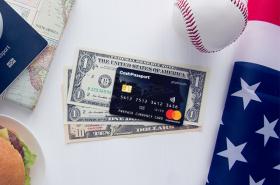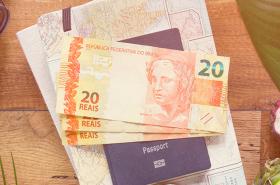Plonked almost smack-bang in the middle of Europe is a lil (actually pretty big) old country called Germany. Boasting the world's fourth-biggest economy, tangled history, gorgeous countryside, unbelievably big beers and more pretzels then you could possibly eat, Germany is a must-visit for many travellers to Europe.
As you map out your German route and calculate how much beer and bratwurst your body can handle, it can be easy to forget the other crucial b-word - budget. Calculating your holiday budget may not be as fun as estimating your bodies carb-limits, it is necessary to ensure you can roll through your holiday stress-free.
While we don't have a bratwurst to body weight calculator, we do have a pretty nifty holiday budget planner that will help you break down your total and daily expenses in Germany.
Before we dive straight into the calculator, let's chat about what goes into a holiday budget.
What goes into a budget for Germany?
Transport
Since Germany is basically on the other side of the world, your flights over there will generally be your most significant expense for the trip. Thankfully the route between New Zealand and Europe is a busy one, so flights aren't nearly as expensive as they used to be. Keep an eye out for deals and travel expos to secure a better price on your airfare.
Once you arrive in Germany, you'll need to consider both cross-country and inner-city transport options. If you were to drive from one side of Germany to the other, it would take you between 10-15 hours (gotta account for snack and toilet breaks). Chances are you probably won't do that, so there are plenty of other options to consider.
Car hire is an excellent option for those wanting to take the trip at their own pace and see the sights. Just be mindful of the young driver fee if you are under 25, and ensure you are covered by travel insurance. If car hire is your preferred method, you'll also need to budget for fuel.
If you've got less time, either trains or flights are your best bet getting between major German cities. Low-cost carriers like RyanAir and EasyJet will often have excellent deals on flights within Europe - be sure to account for your baggage as paying for an extra bag at the airport can be a nasty expense. Trains are generally pretty reliable and comfortable in Europe, and Germany is no exception. If you're doing a more extensive Europe trip then a Eurorail pass is an excellent investment, otherwise, aim to book your tickets a few days or weeks in advance to get a reasonable price.
If the water is more your style, Germany is also serviced by several luxury cruise boats that run along the Danube and Rhine rivers. Perfect if you're keen on seeing a few places without the hassle of having to unpack your bag in a new destination every day.
Inner-city transport differs with each city you are in, though most major cities are well serviced by metro and bus systems, otherwise known as the UBahn. Just hop on Google for exact routes and pricing for your destination.
Accommodation
Like anywhere you travel, accommodation costs will vary based on the location and level of luxury. In all major cities, you will be able to find a place to suit your needs, whether it be a bunk in a hostel or turn-down service in a five-star hostel. Peak travel periods like European Summer or Oktoberfest will inflate prices, so be mindful of this when booking your travel dates.
As you go further out of cities, your accommodation options may decrease slightly. Don't let this deter you though, as quite often you'll have the chance to experience cosier, more traditional accommodation and atmospheres. If you're after a more traditional experience, be sure to hit up Airbnb or look for some cosy bed and breakfasts. All you need is a comfy pillow to rest your weary head after a day of exploring and carb-loading.
Food
My favourite part of any holiday is trying new food, and Germany is not short of delicious delicacies to indulge in. It's no lie that the Germans love a carb or two, so prepare your body for an onslaught of potato, bread, sauerkraut, bratwurst, roasted meat and stews.
In bigger cities like Berlin and Frankfurt there are plenty of 'traditional German restaurants', now they will charge you an arm and a leg for a meal like roast or schnitzel - not to mention the cost of their beers.
If you are on a budget, opt more for street markets and smaller food vendors. In Berlin, you can grab Currywurst and fries for less than 5 euros. Pretzels are also a great staple, filling you up for less than 2 euros. Berlin is a very multicultural city, so you will also have access to heaps of other cuisines.
It's also worth noting that supermarkets like Lidl sell alcohol super cheap. No seriously, I got half-litre cans of beer for 0.50 euros. Sure you won't get them served in steins, but it's an excellent way to save a lot of cash.
Finally, if you are after a you-beaut, traditional German meal, head to Munich or smaller country towns. Here you will be greeted with beer halls, huge bratwurst and more schnitzel then you're body can handle.
Activities
Eating aside, there are plenty of activities to keep you busy. Germany's rich history means there is no shortage of day tours in all of the major cities. Costs for a full-day range between 30 and 100 euros, however, most cities will also have free walking tours. These are generally a pretty high standard and are an excellent way to get acquainted with the city, learn some history and meet fellow travellers. The tour is free, though it is worth having some cash on hand to tip the guide at the end.
Germany is also home to some epic castles and gorgeous national parks that charge minimal entry fees.
If partying is more your vibe, be sure to budget for entry and drinks to Berlin's world-renowned clubs.
Top tip - if you're on a budget only take cash on a night out. Once you run out, there is no chance of drunk you pulling out your card and spending more than necessary, plus you also remove the risk and stress of potentially losing your card.
Pre-departure expenses
Like any holiday, you also need to consider other costs like travel insurance, visas and any vaccinations. Germany is part of the Schengen zone, so Kiwi's don't need a visa for stays under 90 days.
How much does a trip to Germany cost?
Time to put this information to use and give our budget planner a whirl!












